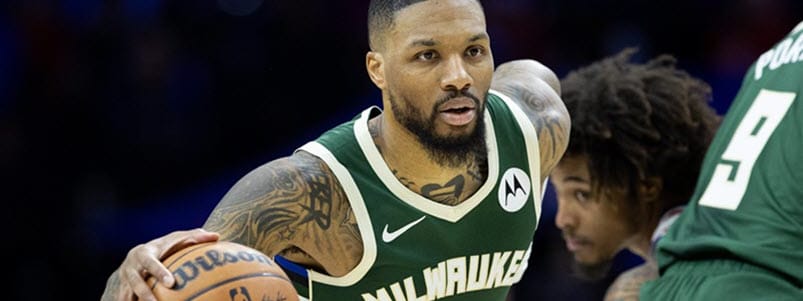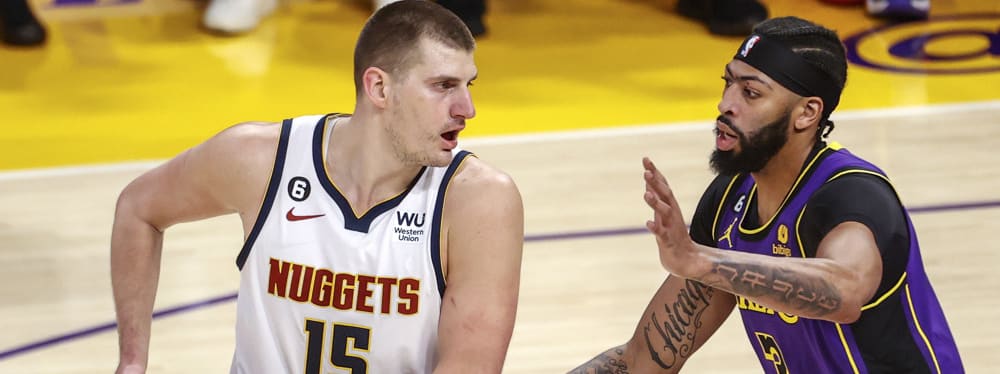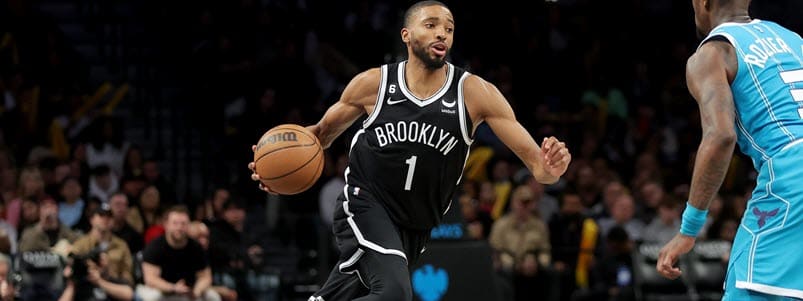Recent RotoWire Articles Featuring Russell Westbrook
See More
To say Westbrook was disappointing in his first season in Los Angeles would be an understatement. Despite playing upwards of 34 minutes per game, Westbrook's production took a hit across the board, ending with season averages of 18.5 points, 7.4 rebounds and 7.1 assists. Those numbers look fantastic, but when we dig a little deeper, the cracks begin to appear. To go with his impressive counting stats, Westbrook managed just 0.9 steals and 1.0 three-pointers, shooting 45 percent from the floor and a woeful 67 percent from the line. Throw in almost four turnovers per game, and you have yourself the 221st-ranked player in nine-category per-game production. After picking up his mammoth player option, it appears Westbrook will be sticking around for at least another season unless, of course, the Lakers can find a suitable trade partner. Based on what we saw last season, and the fact both Anthony Davis and LeBron James were hit by the injury bug, it is hard to see Westbrook upping his productivity. In points leagues, he should continue to have some limited value thanks to his ability to score, pass and rebound. However, for anyone seeking peripheral numbers or for those in roto formats, he makes for a risky target.
Westbrook enjoyed another historic campaign in 2020-21, averaging a triple-double for the fourth time in his past five seasons. His efforts -- especially down the stretch -- made a tangible impact on a Washington squad that went 34-38 and qualified for the postseason for the first time since 2017-18. However, the usual drawbacks to Westbrook's game remained despite the big counting stats. He averaged 4.8 turnovers per contest and shot 43.9 percent from the field, 65.6 percent from the line and 31.5 percent from three-point range. From a fantasy perspective, Westbrook's strengths and struggles make him an elite performer in points leagues but a lesser option in a standard eight- or nine-category head-to-head format. With that said, his production is likely to take a downturn next season given the offseason trade that sent him to Los Angeles to play alongside LeBron James and Anthony Davis. Westbrook has fared well next to a high-usage superstar before. He averaged 27.2 points, 7.9 rebounds and 7.0 assists when teammate James Harden registered the league's second-highest usage rate in 2019-20, but Westbrook has never had to work as a third option as he will behind James and Davis with the Lakers. Perhaps Westbrook will trade a dip in counting stats for increased efficiency, which could buoy his value in nine-category leagues even as it results in a decline in points-based formats. There is also the very real possibility that either (or both) James or Davis could miss parts of the season -- the duo combined to sit out over 60 contests in 2020-21 -- thus catapulting Westbrook back into a more lucrative second-star role. Neither scenario is a guarantee, of course, so drafting Westbrook this season comes with substantially more unknowns than in years past. He is still worthy of a pick within the first few rounds of snake drafts, but the likelihood that he finishes as a steal versus a disappointment is about even.
The 2019-20 season was the first that the former MVP spent on a new team after being traded from the Thunder to the Rockets. Westbrook and James Harden formed maybe the highest-usage backcourt of all time, and despite concerns from fantasy managers, Westbrook's stock was ultimately unaffected by the transition. While Westbrook's peripheral per-game stats took a dip (7.9 rebounds, 7.0 assists), he increased his scoring (27.2 points) while also upping his efficiency from the field (47.2 field goal percentage) and from the charity stripe (76.3). The ups and downs balanced out, and he finished as the 14th-best fantasy player in eight-category leagues on a per-game basis. However, he did miss some time due to injury, sitting out 15 regular-season contests. Given his age (32), history of knee injuries and hyper-athletic play-style, there should be some concern from fantasy managers that Westbrook could end up bitten by the injury bug as his career progresses. He might also struggle getting to the basket and finishing effectively as his athleticism declines. But after just one season alongside Harden, Westbrook was traded during the offseason to the Wizards in exchange for John Wall and a protected 2023 first-round pick. Westbrook, again, suits up with another high-usage backcourt mate, though one who isn't as isolation-heavy and specialized as Harden. Beal has been a more willing off-ball player throughout his career, which means we could see Westbrook handle the ball more and possibly bring his assists back up closer to 10 per game.
The 2016-17 Most Valuable Player and an eight-time All-NBA selection, Westbrook will begin his first season with a new franchise in 2019-20. He had been a member of the Thunder organization since being drafted fourth overall in 2008, but he was traded to the Rockets over the summer in exchange for, mainly, Chris Paul. Westbrook's bloated contract was thought by some to be untradable, but Houston was willing to take the chance to pair him with James Harden, another former MVP. With both players being so ball-dominant -- Harden's 40.5% usage in 2018-19 ranking No. 1 and Westbrook's 30.9% usage ranking No. 10 -- it's right for fantasy owners to wonder how the situation will affect Westbrook's role and statistics. As was the case with Paul, coach Mike D'Antoni will likely stagger Westbrook and Harden as much as possible, so it would be surprising if Westbrook saw a massive drop in numbers. The main concern with Westbrook will continue to be his shooting percentages. Westbrook is one of only two guards in the three-point era to take at least 20 shots per game while shooting worse than 45 percent from the field and 70 percent from the free-throw line in a single season -- the other being Baron Davis in 2003-04. Efficiency aside, Westbrook's raw numbers continue to fuel his fantasy value. He's averaged a triple-double for the past three seasons -- a streak Westbrook will likely try to continue for as long as possible.
Coming off a 2016-17 MVP season where he averaged a 30-point triple-double, Westbrook was joined by Paul George and Carmelo Anthony last year. Though he still managed to average a triple-double and lead the league in assists, Westbrook saw his scoring average drop by 6.2 points, largely a product of taking just under three fewer shots per game. He also regressed as a three-point and free-throw shooter, losing 4.5 percent on his threes and 10.8 percent on his freebies. On a couple positive notes, he committed 57 fewer turnovers and swiped 15 more steals on the season despite playing one fewer game than in 2016-17. Over the summer, general manager Sam Presti traded Anthony and his 15.0 shots per game for Dennis Schroder. Schroder averaged 17.1 shots last season, but was the No. 1 option for the tanking Hawks, and will likely transition into a sixth-man role with lower usage in OKC. This is all to ask the question: Will Westbrook trend closer to his MVP production with Melo elsewhere? It’s an answer we won't get until we're in the season. But, considering he’s missed just five games in three years and is a walking triple-double, Westbrook is a no-brainer first-round Fantasy pick. The optimists who believe Melo’s departure will open things up can justify taking Westbrook in the top five.
Westbrook racked up accolades at an alarming rate last season in his first year without the accompaniment of Kevin Durant. Most Valuable Player, First-Team All-NBA, sixth consecutive All-Star Game, averaged a triple-double for the first time since Oscar Robertson in 1962, and many more to boot. But with that season done and in the history books, can he do it again? The offseason acquisition of Paul George suggests that Westbrook will at least be less inclined to average a triple-double again since Westbrook won’t likely have to will a lackluster supporting cast to victory each and every night like what took place last season. While averaging another triple-double seems unlikely, he’s right in the middle of his prime and should still be widely sought after as the No. 1 draft pick across most Fantasy formats. Those not inclined to use the first overall pick on Westbrook are probably alarmed by the 5.3 turnovers he averaged last season, the fact that his field-goal percentage fell short of the league average by 3.2 percent, or adverse effects overall from the addition of George. After setting career highs in points (31.6 -- previously 28.1), rebounds (10.7 -- previously 7.8), and three-pointers (2.5 -- previously 1.5), there's a decent chance the 28-year-old takes a step back in those three categories in particular, though he'll still be one of the top Fantasy options in what's expected to be another spectacular season.
With Kevin Durant sidelined for 55 games during the 2014-15 season with a broken right foot, Westbrook swallowed the Thunder offense whole, tallying 11 triple-doubles and averaging a career-high 28.1 points per game. Westbrook's production was expected to take a step back last season with Durant back to full health, but the point guard somehow managed to outdo himself. While his scoring average dropped to 23.5 points, Westbrook upped his efficiency from the field (45.4%) and set career-best marks in assists (10.4 per game) and rebounds (6.0). He also chipped in 2.0 steals and 1.3 treys per appearance. The jump in dimes and boards helped Westbrook accrue 54 double-doubles and an NBA-leading 18 triple-doubles, making him a feature of many winning fantasy rosters. Following Durant’s surprising decision to bolt for the Warriors in July, Westbrook figures to revert to production similar to what he offered in 2014-15, though the Thunder roster should be a little more balanced this time around. The addition of Victor Oladipo and the presence of improving bigs in Enes Kanter and Steven Adams gives Westbrook some weapons to keep involved with the offense, but despite coach Billy Donovan's comments to the contrary this summer, the team largely figures to crest and fall as Westbrook does. After agreeing to a restructured contract and extension with the Thunder in August that will keep him in Oklahoma City through 2018-19, Westbrook is officially a foundational player for the organization. It's fairly safe to assume that he'll top the league in usage this season after consistently finding himself among the league leaders even when Durant around. The likelihood that Westbrook will have to settle for tougher shot attempts and assume even more ball-handling responsibilities will almost certainly translate into a drop in his shooting percentages and a rise in his turnover rate, but a counting stats bonanza would more than make up for it. He's an easy top-five pick in both eight- and nine-category leagues.
Westbrook had a remarkable 2014-15 season. After suffering a broken right hand in just the second game of the season, he sat out the next month before returning to put together the best fantasy season of his career. Through 67 games played, Westbrook averaged 28.1 points, 1.3 three-pointers, 7.3 rebounds, 8.6 assists, 2.1 steals, and 0.2 blocks in 34 minutes per game while shooting 43 percent from the field, 30 percent from three, and 84 percent from the line. Kevin Durant suffered a broken right foot last season that limited him to 27 games, giving Westbrook a yellow-bricked road by which to travel to see the Wizard, and when Westbrook met the Wizard of OZ, he asked him for triple-doubles, 11 of them. During a 12-game stretch from the end of February through the middle of March, he collected eight triple-doubles. Nothing could stop Westbrook last season when Durant was out of the lineup, but this season will see Durant back healthy, which should bring Westbrook's production back closer to the production he had when playing in tandem with Durant. Though it's unlikely new coach Billy Donovan will ask Westbrook to do anything different to the point that it would affect his fantasy value considerably, it's worth noting that Donovan could have an impact in how Westbrook gets his stats this season. The Thunder are deeper than ever with this season after adding Dion Waiters and Enes Kanter in separate trades last season, so the ball will have to find its way out of Westbrook and Durant's hands a little more this season, which could make both players see slight dips in their counting stats, but it could also help improve their efficiency numbers.
After an injury-shortened 2013-14 in which he played in only 46 games, Westbrook appears to be at full strength heading into the 2014-15 season, and that's music to the ears of the Thunder and potential fantasy owners alike. The 25-year-old, who has had three different surgeries on his right knee over the past couple years, decided to sit out the 2014 FIBA Basketball World Cup in order to get additional time to rest and prepare for the start of the season. When healthy there are few point guards as productive as Westbrook, who averaged 21.8 points, 6.9 assists, 5.7 rebounds, and 1.9 steals in 31 minutes per game during the regular season and 26.7 points, 8.1 assists, 7.3 rebounds, and 2.2 steals throughout Oklahoma City's playoff run. Westbrook finished eighth overall and second (behind only Chris Paul) among all guards in PER (player efficiency rating) at 24.74. A slight uptick in turnovers (from 3.3 per game in 2012-13 up to 3.8 in 2013-14) is somewhat of a concern, and Westbrook's shot selection has always been an issue, but the positives far outweigh the negatives. The explosive guard is just now entering his prime and appears poised to have another outstanding season with the Thunder.
Westbrook was something of an iron man for the Thunder last season, starting all 82 games for a team expected to challenge for a spot in the NBA Finals. But a torn meniscus in his right knee cut his season – and the Thunder's – a bit short; OKC managed to beat Houston in the first round, but lost to Memphis in the conference semifinals. Westbrook should make a complete recovery from April surgery and be his old, explosive self, but he may not be completely recovered for the season opener. And it may take even longer before his confidence returns fully. Bear in mind – Westbrook's style of play, and his trademark, nigh-unstoppable pull-up jumper – puts an awful lot of strain on his knees. If he isn't his old, fearless self, his overall game (and his fantasy numbers) could take a significant hit. It's not like he can simply rely on his jump shot (32 percent 3Pt in 2012-13). Like several other high-scoring point guards, Westbrook might benefit from some minutes playing off the ball, which would allow him to concentrate on getting his own shot at times. OKC doesn't really have a proven backup point guard that would allow that, but the team is reportedly high on third-year player Reggie Jackson, who may grow into the role.
Westbrook might be the top point guard of his generation--a group that includes 2011 MVP Derrick Rose. His athleticism is nothing short of breathtaking. There isn't a guard in the league that can stay in front of Westbrook when he gets room to operate off the dribble. And he's developed a pull-up jumper that ranks as one of the league's most unstoppable moves. The only real question is whether or not he's a true point guard. He played off the ball in college and, at times, seems more comfortable as scorer than a facilitator. The numbers bear that out. His assist average dropped to 5.5 last year after spending the previous three in the eight-plus range. With extra seasoning, Westbrook continues to improve his shot. He hit almost twice as many three-pointers in the lockout-shortened 2011-12 season as he did in 2010-11. The additional threes didn't hurt his overall shooting numbers; he posted a career-best 45.7 FG percentage last season. He is also an excellent rebounder for his position. Probably the most reassuring thing about drafting Westbrook is that fact that he has yet to miss a game in his NBA career.
Russell Westbrook spent much of last season making the argument that he’s neck-and-neck with Derrick Rose for “top young point in the NBA” honors. He spent the playoffs showing how far he still has to go. Westbrook finished the season with a scoring average just under 22 ppg – second only to Rose among point guards – while racking up 8.2 assists and 4.6 rebounds. And he’s got room to improve; bear in mind, he’s still just 22 and relatively new to the point guard position; at UCLA, he mostly played off the ball. That inexperience showed against better competition in the postseason, when Westbrook drew heavy criticism for taking over too much of a scoring role at the expense of his all-world teammate Kevin Durant. Westbrook may continue to develop as a scoring guard and hand over some of the ball-handling responsibility to James Harden or Eric Maynor, or simply learn to pick his spots better. Either way, he’ll be a tremendous fantasy value.
Westbrook's development over two NBA seasons is nothing short of staggering. Remember, Westbrook didn't even play the point much in college, and was drafted primarily for his defense. He was brought along slowly, playing off the ball for much of his rookie season. But after year two of his NBA career, he's regarded as one of the better young points in the league and is spending this summer as a key part of Team USA's World Championship roster. Westbrook has much in common with Rajon Rondo; both are outstanding athletes and stellar defenders who move the ball well and can break down defenses off the dribble. And like Rondo, Westbrook's outside shot is spotty at best. But unlike Rondo, Westbrook actually does use his three to keep defenses honest; he had 40 makes on the season on just .270 shooting from long range; that number contributed to his overall .417 shooting from the field. Look for Westbrook to continue to improve along with his Thunder teammates; though he's entering his third year in the league, Westbrook won't hit age 22 until the second week of the season.
Westbrook’s first season for the Thunder may become the template used for all rookie point guards in years to come. Westbrook came into the NBA as yet another backcourt ‘tweener – primarily a shooting guard in college, who would need to transition to the point to survive in the NBA. The Thunder – knowing that they had virtually no chance of competing in the stacked Western Conference anyway – brought their prized rookie along slowly, with most of his minutes coming at the two spot initially. By season’s end, Westbrook was firmly entrenched as the starter and a key part of one of the most promising young rosters in the league – allowing Thunder management to pass on uber-hyped point guard prospect Ricky Rubio in the 2009 draft. As a fantasy player, think of Westbrook as Rajon Rondo-lite. Like the Celtics’ point, Westbrook is a supreme athlete and outstanding defender, but his floor leadership (274 turnovers) and outside shot (just over 27 percent from three, with 129 attempts on the year) need some work. He’s an excellent rebounder for his position, snagging just under five boards per game as a rookie.
Oklahoma City is rebuilding with defense, so it shouldn't have been a surprise when the team selected one of the best defenders in the draft with the fourth overall pick last June. Westbrook will see significant minutes as the team evaluates whether he is indeed the point guard of the future. He'll see time at shooting guard, as well, and likely will be used late in games for his defense. If Westbrook proves capable of directing the offense, he could start at point guard by season's end with mentor Earl Watson coming off the bench. Otherwise, he'll back up the guard positions and start at the two-spot when Kevin Durant starts at the three. Westbrook has a good mid-range jumper, but would be more valuable if he developed a long-range shot. Skilled in transition where his excellent athleticism serves him well, Westbrook needs to show he can play a half-court game, too.













